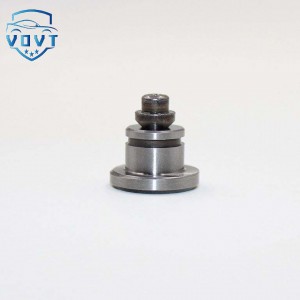High Quality Delivery Valve 504660 Diesel Engine Spare Parts
Products Description
| Reference Codes | 504660 |
| Application | / |
| MOQ | 12 PCS |
| Certification | ISO9001 |
| Place of Origin | China |
| Packaging | Neutral packing |
| Quality Control | 100% tested before shipment |
| Lead time | 7~15 working days |
| Payment | T/T, L/C, Paypal, Western Union, MoneyGram or as your requirement |
Study on the Influence of Delivery Valve Lag Characteristics on Fuel Injection Quantity Accuracy
Abstract
The delivery valve is a critical component in high-pressure fuel injection pumps, responsible for controlling pressure recovery, residual pressure retention, and backflow dynamics after each injection cycle. However, under high-frequency and high-pressure operating conditions, the dynamic behavior of the delivery valve often exhibits lag characteristics, including delayed opening, delayed closing, and inertia-induced overshoot. These lag phenomena cause deviations in the injected fuel quantity and directly affect combustion stability, emissions, and engine performance. This study investigates the mechanisms through which delivery valve lag alters fuel injection metering accuracy and proposes optimization strategies to improve system precision.
A combined CFD–FEM simulation model is developed to analyze the interaction between fuel flow, valve motion, and pressure wave propagation within the pump chamber. Results show that opening lag is mainly caused by hydraulic resistance, spring stiffness mismatch, and insufficient pressure rise rate. Closing lag, on the other hand, is strongly influenced by valve mass, damping effects of residual fuel, and reverse pressure oscillations. Both types of lag lead to extended effective injection duration, higher injection quantity, and increased cycle-to-cycle variation.
Experimental measurements conducted on a high-pressure pump test bench verify the simulation findings. Under high-speed conditions (≥1500 rpm), delivery valve lag contributes to injection quantity deviations of up to 4–7%. Pressure waveform analysis reveals that delayed closing causes secondary injection pulses and unstable pressure decay, significantly reducing metering accuracy.
To address these issues, several optimization strategies are proposed:
-
Reducing valve mass and optimizing geometry to improve dynamic responsiveness.
-
Adjusting spring preload and stiffness to balance rapid response with stable sealing.
-
Introducing low-friction coatings such as DLC to minimize viscous damping.
-
Optimizing the valve seat and flow passage design to lower flow-induced resistance.
Application of these improvements in simulation and bench tests shows that injection quantity deviation can be reduced by 30–45%, and cycle stability is significantly enhanced. The study highlights the importance of delivery valve dynamic behavior in achieving high-precision fuel metering for modern high-pressure injection systems.





























